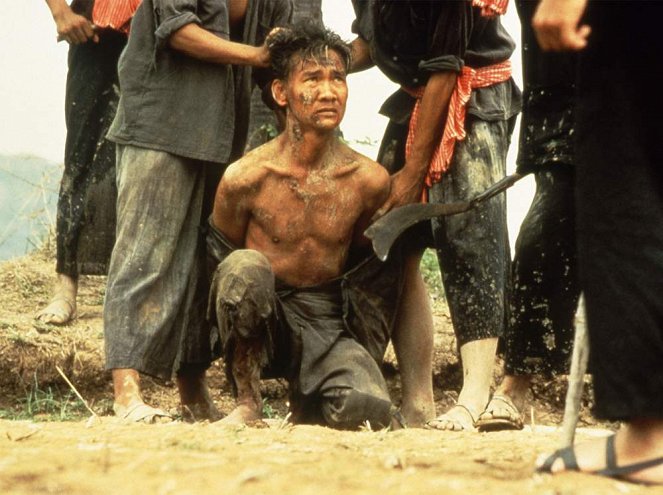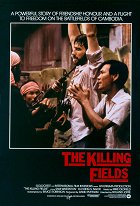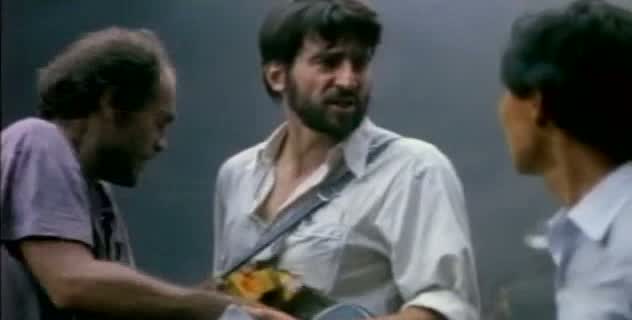Directed by:
Roland JofféScreenplay:
Bruce RobinsonCinematography:
Chris MengesComposer:
Mike OldfieldCast:
Sam Waterston, Haing S. Ngor, John Malkovich, Julian Sands, Craig T. Nelson, Spalding Gray, Bill Paterson, Athol Fugard, Mark Long, Patrick Malahide (more)VOD (1)
Plots(1)
A photographer is trapped in Cambodia during tyrant Pol Pot's bloody "Year Zero" cleansing campaign, which claimed the lives of two million "undesirable" civilians. (official distributor synopsis)
Videos (1)
Reviews (9)
The Killing Fields is a movie where ambition simply oozes out of every frame. I’m not saying it’s bad. Especially when it’s in the hands of a director who knows how to avoid cheap sucking up to the Academy (although Lennon at the end was a step way over the mark). In the first half I couldn’t help asking myself why the story revolves round such an uninteresting, self-centered journalist when his gofer who he treats like shit is a hundred times more interesting. And luckily the filmmakers thought this too and in the second half they put him to the fore. And did well to do it in my eyes. Otherwise the scenes like developing photos in Spartan conditions, the video with Nixon’s speech and shots of the atrocities of the Khmer Rouge cut with Vincerò or lost in the killing fields are such powerful scenes that Roland Joffé has earned my greatest admiration. On the other hand, it doesn’t change the fact that I can see mistakes here. Which I can’t say about his next movie, however much I might want to.
()
The first half of the film wasn't uninteresting and I can't say that nothing happened in it, but compared to the second half it was really weak and overly ordinary. I also have some reservations about Oldfield's music, which fits the plot like a glove in places (quiet passages or the dramatic evacuation), but at other times it sticks out and distracts from the film (the captivity of the journalists, for example). As I've already said, everything that is worth seeing in the film happens in the second half - Dit Pran wanders Cambodia (here Rolland Joffé was obviously preparing for the upcoming Mission), Schanberg watches TV at home with Vincero playing, Schanberg searches for Pran... And then, of course, the beautiful ending (of course I feel bad for Lennon). Three and a half.
()
At first, it seems like just a great performance by Sam Waterston, but this film develops incredibly until you reach the point where it's an immensely powerful drama, both socially and humanly. War is depicted here without embellishments, yet most of the time, we're not even on the battlefield. The impact on the viewer who sees the result is even greater.
()
The Oscars went to the right people. The Killing Fields is an extraordinary film (not only) in the contemporary context with excellent camera work, a strong story, and high-quality casting. It is not the fault of the creators that some people lack context. At that time, it was about fresh events when the genocide of the Khmer Rouge on their own nation shook public perception worldwide. With the passage of the decades, a political film has become a historical film. But that is an inevitable process. The story is not encrypted in any way, and to understand its background it is enough to read some basic information about Cambodia in the 1970s. The film depicts the meeting and developing friendship of an American reporter with his local guide during the height of the Indochina War. After the fall of the pro-American regime, foreign reporters leave the country, but the native interpreter gets caught up in the machinery of the ultra-left regime and survives only with great effort and a good dose of luck. The drama cannot overshadow the fact that it is directed by Western filmmakers and intended for a Western audience - a purely Cambodian approach to the material would be even more depressing, darker, and more hopeless. But certainly also more atmospheric. Even so, the shows us a number of extraordinary scenes of war chaos and the suffering of prisoners in reeducation camps and subjects of the regime. Joffé shoots in a documentary style, and you simply have to believe his depiction of the landscape exposed to horrors. Mike Oldfield's impressive sound design is also worth mentioning. Haing S. Ngor, an immigrant and non-actor, a doctor by profession, won the Oscar for Best Supporting Actor for his role as Dith Pran. It is certainly arguable that American bombardment of the landscape is responsible for the extreme brutality of the Khmer Rouge. However, significantly larger and more systematic bombings in Vietnam did not lead to the radicalization of the local regime. The repulsive nature of the Khmer Rouge regime is owed in part to the fact that their leaders drew inspiration from Maoism and Mao's Cultural Revolution of the 1960s. Their profile also manifested through persecution by government authorities. Sihanouk was one of the typical oriental despots, and his secret police tortured and killed people on a whim. Overall impression: 90%.
()
Although it’s rather misleading that historical films of this kind receive high ratings automatically and partly because they exist, this morally worthy and emotionally charged gem basks in praise, and rightly so. It’s very painful to see all the heinous acts that people are capable of doing to others, and it’s even more painful with the virtuoso Roland Joffé, the famous creator of the no less appealing, artistically intoxicating The Mission, behind the camera. He was able to materialize the atmosphere of occupied Cambodia, the conflict of the power of love and friendship with pure human suffering and the unadulterated joy at the moment when John Lennon launched his "Imagine" so perfectly that I could almost say "yes, I was there". So, yes, this film deserves all the high ratings, simply because it exists. 95%
()
Gallery (73)
Photo © Warner Bros. Pictures



Ads